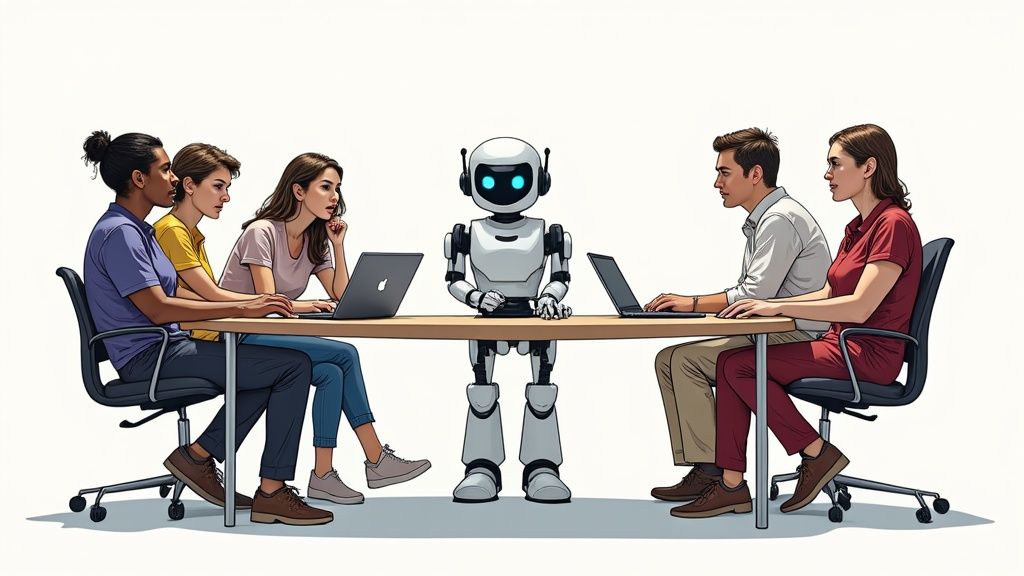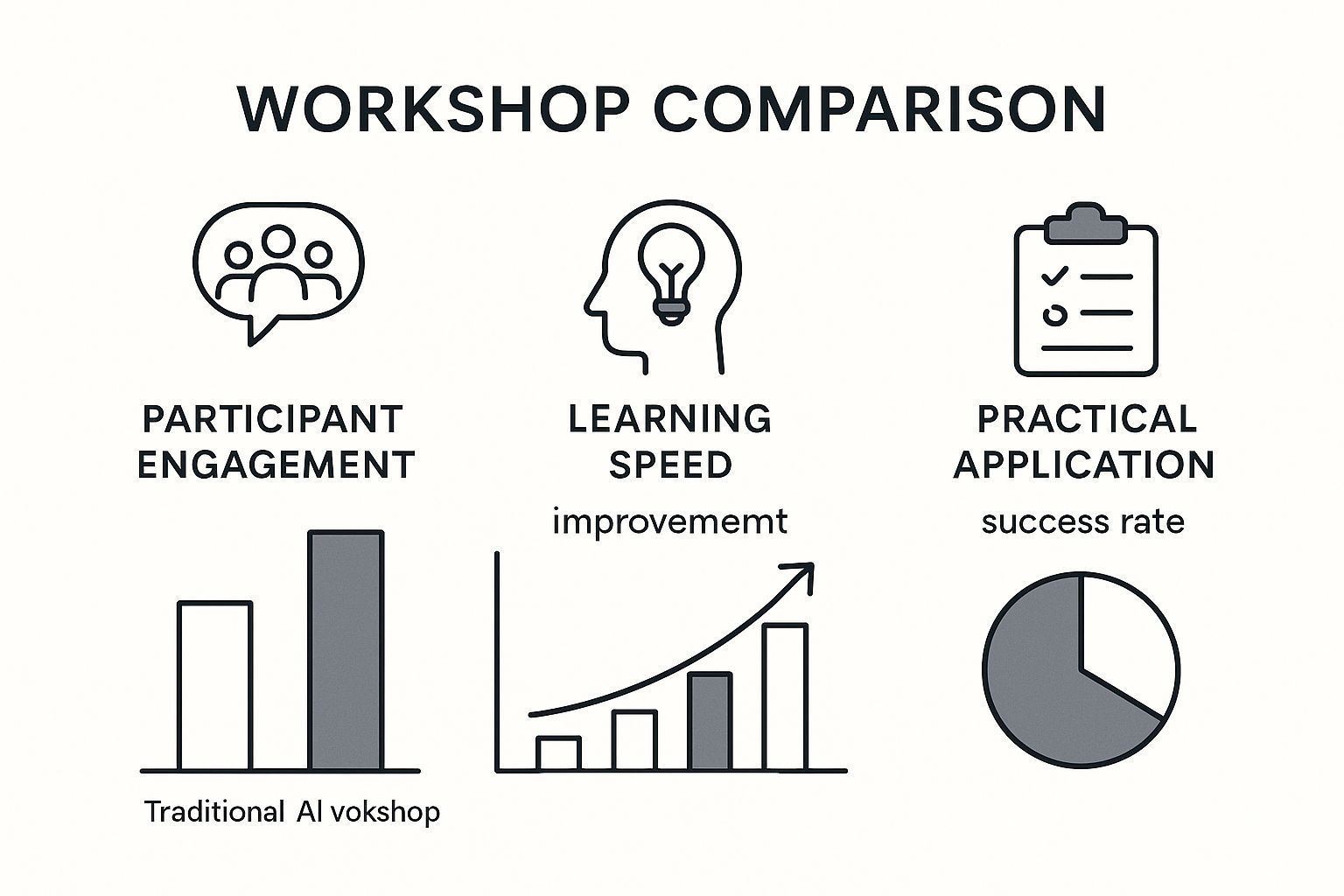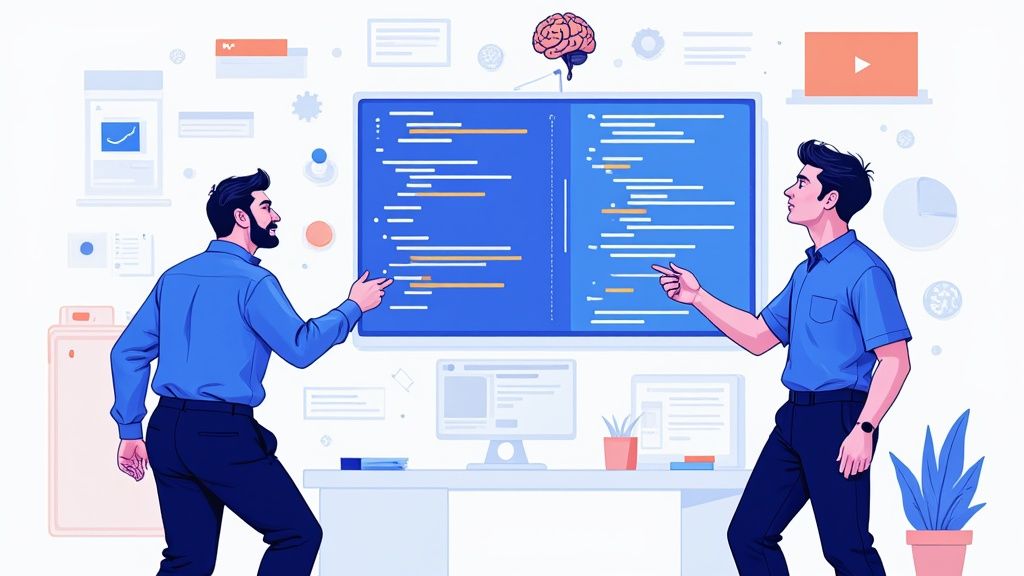Why Artificial Intelligence Workshops Are Transforming Careers
The demand for artificial intelligence (AI) expertise is booming, but traditional learning methods often fall short. Professionals looking to boost their careers are turning to a more engaging and effective solution: the AI workshop. These focused, hands-on sessions offer a unique blend of theory and practical application, making them a compelling alternative to conventional education.
Hands-On Learning: The Key to AI Mastery
AI workshops aren't about passively absorbing information; they're about actively applying it. Participants dive in and gain practical experience by working on real-world projects and challenges. This differs greatly from traditional classrooms, where theory can overshadow practical application. This hands-on approach builds a deeper understanding of AI concepts and equips participants with the in-demand skills employers value.
Bridging the Gap Between Theory and Practice
Think of learning to ride a bike by only reading a manual. You might grasp the mechanics, but true understanding comes from actually riding. AI workshops provide the "bike" – the hands-on experience and guidance needed to navigate the complex world of AI. This practical learning leads to greater confidence and competence when using AI principles in the real world. Want to dive deeper? Check out How to master your AI journey with our workshops.
Investing in In-House Expertise
Companies, from startups to Fortune 500 giants, are recognizing the power of these immersive learning experiences. They're investing in AI workshops for their teams rather than outsourcing crucial AI skills. This shows a growing trend towards developing internal AI talent and an acknowledgement that practical skills are vital for driving innovation and staying competitive.
Collaborative Environments for Breakthrough Innovation
The collaborative nature of these workshops is another major driver of innovation. Participants work together, share ideas, and learn from each other, creating a vibrant atmosphere of shared discovery. This dynamic environment often sparks breakthrough insights and builds a sense of community. Major data and AI events like Databricks Data + AI Summit and the AI Summit London highlight the global importance of AI training. These events, packed with sessions and expert speakers, reflect the growing demand for AI professionals. Explore more about upcoming AI events.

The DNA of Exceptional Artificial Intelligence Workshops
Not all AI workshops are created equal. Some are truly enriching learning experiences, while others fall short, feeling more like basic tutorials. This raises a critical question: what are the key ingredients that separate the truly exceptional workshops from the rest? After talking with both facilitators and participants, a clear pattern emerges. The most effective workshops prioritize hands-on, real-world project implementation over theoretical lectures. This practical approach helps participants solidify their understanding and build valuable skills they can actually use.
The Importance of Practical Application
Exceptional AI workshops recognize that real learning happens through active participation. They offer opportunities for attendees to grapple with real-world problems, mirroring the challenges they'll likely face in their professional lives. This active learning style cultivates a deeper understanding of AI principles and builds confidence in applying them practically.
Structuring for Diverse Learners
These workshops are also thoughtfully designed to accommodate a range of learning styles. They strike a balance between structured guidance and open-ended problem-solving. This ensures everyone, regardless of their background or preferred learning method, can grasp the material and actively contribute. For instance, many workshops incorporate visual aids, interactive exercises, and group discussions to cater to different learning preferences.
Skill Retention: Bootcamps vs. Spaced Learning
The structure of an AI workshop plays a significant role in skill retention. While intensive bootcamps offer a quick deep dive, spaced-learning approaches, which distribute learning over time, have proven effective for long-term retention. A 2023 study revealed that spaced learning could improve knowledge retention by up to 50% compared to traditional cramming. This emphasizes the importance of choosing a workshop format that aligns with your individual learning goals and how you learn best.
Beyond the Workshop: Building Communities
The benefits of top-tier AI workshops reach far beyond the scheduled sessions. They foster a sense of community, connecting participants with peers and instructors. These connections provide invaluable ongoing support, networking opportunities, and access to a broader pool of knowledge. This supportive environment is essential for continued learning and professional development. To see how AI is being used in different industries, check out this AI in Wealth Management guide.
Measuring Impact and ROI
Finally, the best workshops understand the importance of building a strong portfolio. They emphasize the development of projects that showcase participants' skills and build their credibility. These projects go beyond generic exercises, offering opportunities to create unique pieces that highlight individual talents and capabilities. The following data chart illustrates the relative importance of different workshop features, according to feedback from 500 participants:
The data chart below visualizes feedback from workshop participants on the importance of various workshop features.

- Real-world projects: 85% of respondents ranked this as "very important" or "essential."
- Networking opportunities: 70% highlighted the value of connecting with peers and instructors.
- Portfolio development: 65% emphasized the importance of gaining tangible project experience.
- Ongoing community support: 60% appreciated access to post-workshop resources and connections.
As the chart clearly demonstrates, participants prioritize practical application, networking opportunities, and building a strong portfolio. This underscores the idea that effective AI workshops move beyond theory, providing concrete, career-boosting benefits.
To further understand the differences between workshop types, take a look at the comparison table below. It summarizes the essential components and their effectiveness across various levels.
To help you choose the right workshop, the table below summarizes the key elements of successful AI workshops at different levels, along with their effectiveness ratings.
Essential Components of Successful AI Workshops
| Workshop Component | Beginner Workshops | Intermediate Workshops | Advanced Workshops | Effectiveness Rating |
|---|---|---|---|---|
| Foundational Concepts | High Emphasis | Medium Emphasis | Low Emphasis | High |
| Hands-on Projects | Basic, Introductory | Intermediate Complexity | Complex, Real-world | High |
| Real-world Application Case Studies | Introductory Examples | Industry-specific Cases | Advanced Research & Development Applications | Medium |
| Networking Opportunities | Structured Activities | Guided Networking Sessions | Open Networking Events | Medium |
| Advanced Tools and Techniques | Introduction to Common Tools | In-depth Exploration of Key Tools | Cutting-edge Tools and Research Methods | Medium |
| Career Guidance and Mentorship | Basic Career Advice | Industry-specific Guidance | Advanced Career Strategies and Mentorship | Low |
| Post-workshop Support | Basic Q&A and Resources | Access to Online Forums and Communities | Personalized Support and Mentorship | Low |
The table highlights how different workshops prioritize various aspects of learning. While beginner workshops focus on foundational concepts and basic hands-on experience, advanced workshops delve into complex projects and cutting-edge tools. Choosing the right workshop depends on your current skill level and career goals.
Finding Your Perfect Artificial Intelligence Workshop Match
The world of Artificial Intelligence (AI) is buzzing with excitement, and the learning opportunities are growing just as fast. With so many AI workshops popping up, finding the right one can be a bit like searching for a needle in a haystack. You need a good plan to sift through the choices and land on a workshop that truly aligns with your goals.
Defining Your AI Workshop Goals
Before you jump into browsing workshops, take some time to think about what you want to achieve. Are you switching careers and hoping to break into AI? Or are you already working in the field and looking to specialize in a specific area? Figuring out your objectives will help you narrow down the options and choose a workshop that provides the right skills and knowledge. For example, if you want to become a data scientist, you’ll want a workshop that focuses on practical skills like machine learning algorithms and data visualization.
Evaluating AI Workshop Quality
It's easy to get swept up in marketing hype, so how can you tell if an AI workshop is truly high-quality? Some key factors to consider include the instructor-to-participant ratio, the curriculum, and post-workshop support. A smaller ratio usually means more individual attention and feedback. Also, look for a curriculum that's up-to-date with current industry trends and includes hands-on projects. Good post-workshop support, like online forums or mentoring, can make a big difference in your overall learning. This focus on practical application and continued learning is gaining traction worldwide. The International Workshop on Statistical Methods and Artificial Intelligence (IWSMAI) 2025, held in Patras, Greece from April 22nd to 24th, is a great example. It emphasizes both theory and practical application in fields like bioinformatics and medical statistics. Learn more about IWSMAI and its impact on AI research.

Certifications and Portfolio Building
Certifications can definitely give your resume a boost, but their importance can vary depending on the industry. Do some research to see which certifications employers value in your field. But remember, certifications aren't everything. Practical experience is becoming more and more important. Look for workshops that offer portfolio-worthy projects. These projects show potential employers what you can do and prove that you can apply AI concepts to real-world problems.
Emerging Workshop Formats
The format of a workshop can really affect how you learn. Keep an eye out for workshops that use immersive technologies like virtual reality or simulations. These innovative formats can make learning complex ideas more engaging and give you more realistic practice opportunities. Choosing the right workshop format, along with understanding the value of certifications, can significantly increase your return on investment.
Maximizing Your Artificial Intelligence Workshop Investment
Investing in an AI workshop can be a game-changer for your career. But just showing up isn't enough. To really see a return on that investment, you need a strategic approach that covers everything from pre-workshop prep to post-workshop action. Think of it like a garden: you need to cultivate it to see real growth.
Pre-Workshop Preparation: Setting the Stage for Success
The most successful workshop attendees don't just arrive; they prepare. This might mean reviewing core concepts, exploring relevant tools like TensorFlow, or setting personal learning objectives. Just like an athlete training for a big game, this pre-workshop groundwork sets you up for focused learning and lets you hit the ground running. Want a head start? Check out: How to master AI concepts with our online courses.
In-Workshop Engagement: Extracting Maximum Value
Once you're in the workshop, active engagement is key. Ask questions, participate in discussions, and take detailed notes. Don't be afraid to get your hands dirty and apply what you’re learning during exercises and group projects. Think of the workshop as a treasure trove: the more you explore, the more valuable insights you'll discover.
Transforming Exercises into Portfolio Pieces
Most workshops include standard exercises. But here's a pro tip: elevate these by adding your own unique spin or applying them to a personal project. This transforms ordinary exercises into impressive portfolio pieces that showcase your individual skills and creativity. These personalized projects not only demonstrate your understanding, they provide tangible proof of your practical abilities.
Networking: Building Valuable Connections
AI workshops offer an incredible opportunity to network with fellow AI enthusiasts, seasoned professionals, and even potential mentors. Don't miss out! Connect with your fellow participants and instructors. These connections can open doors to exciting collaborations, job opportunities, and a valuable support system as you navigate your AI journey.
Post-Workshop Action: Bridging the Implementation Gap
One of the biggest hurdles after any workshop is putting what you’ve learned into practice. To bridge this "implementation gap," create a post-workshop action plan. This might involve setting achievable goals, working on personal projects, or joining online communities to continue learning and reinforcing your new skills. Consistent practice is crucial for solidifying your new knowledge and making it a permanent part of your professional toolkit.
Overcoming Challenges and Achieving Long-Term Success
The path to AI mastery isn't always easy. Challenges are bound to arise. To help you navigate those bumps in the road, we've put together a table outlining some common obstacles and solutions:
To help you get the most from your AI workshop experience, let's look at some practical strategies you can employ before, during, and after the event.
The table below provides a roadmap for maximizing your ROI on AI workshops, outlining actionable techniques and addressing potential challenges at each stage:
AI Workshop ROI Maximization Strategies: Actionable techniques for before, during, and after an artificial intelligence workshop to ensure long-term skill retention and application.
| Stage | Action Items | Expected Outcomes | Common Challenges | Solutions |
|---|---|---|---|---|
| Pre-Workshop | Define learning goals, review prerequisites, gather resources. | Focused learning, efficient use of workshop time. | Lack of clear objectives, feeling overwhelmed by the material. | Set SMART goals (Specific, Measurable, Achievable, Relevant, Time-bound). Break down pre-workshop study into manageable chunks. |
| In-Workshop | Active participation, thorough note-taking, apply concepts to exercises. | Deep understanding, strong grasp of practical application. | Difficulty understanding concepts, feeling lost during exercises. | Ask questions, seek clarification from instructors, collaborate with fellow participants. |
| Post-Workshop | Develop an action plan, continue practicing, join online communities. | Skill retention, successful implementation of learned concepts. | Difficulty applying learned concepts, lack of motivation to continue learning. | Set realistic goals, break down projects into smaller tasks, find an accountability partner. Consider platforms like GitHub to collaborate and share your work. |
By proactively addressing these challenges, you can ensure a smoother post-workshop experience and translate your new AI knowledge into tangible career advancements.
Artificial Intelligence Workshops That Transform Organizations

Smart companies are realizing the power of artificial intelligence (AI) workshops. These workshops are a great way to boost innovation and stay ahead of the competition. They're not just about training individuals; they're about transforming entire organizations. This is done by encouraging teamwork and tackling specific business challenges. Companies are starting to see training not as an expense, but as a smart investment.
Designing Workshop Experiences for Organizational Change
These workshops are often customized to meet an organization's unique needs. For example, a company wanting to improve customer service might create a workshop about AI-powered chatbots. This targeted approach helps ensure the workshop delivers real business results, making it a valuable investment. Connecting the workshop with business goals makes the biggest impact and keeps it relevant to what people do every day.
Measuring the Real Impact of AI Workshops
Companies want to see real results from these programs, so they're moving past simple satisfaction surveys. They're using hard numbers to measure the return on investment (ROI). For example, they might track things like higher sales, faster customer service responses, or better product development after an AI workshop. This data proves the workshop's value and justifies the cost.
Fostering Cross-Departmental Collaboration Through AI
Team-based AI workshops also help break down barriers between departments. By bringing people from different areas together, these workshops boost collaboration and communication. This can lead to new and creative solutions. The shared learning experience also builds stronger relationships and a better understanding of how AI can help the whole organization. Plus, it creates a sense of community and shared purpose, making teams even stronger. To further enhance organizational transformations, consider leveraging these resources: affordable AI tools.
Sustaining Momentum After the Workshop
Successful organizations know that learning doesn't stop when the workshop ends. They put strategies in place to keep the momentum going. This might involve setting up internal communities, providing access to more learning resources, or starting mentorship programs. These initiatives reinforce what people learned and encourage continuous development. This ongoing learning ensures the workshop makes a lasting impact.
Building AI Centers of Excellence
Some organizations are taking it a step further by building AI Centers of Excellence. These centers act as central hubs for AI knowledge and expertise. They offer resources, guidance, and support to everyone in the company. They encourage a culture of learning and innovation, helping the organization stay ahead in the world of AI. This centralized approach helps companies scale their AI capabilities and make AI a core part of their operations.
For example, the Generative AI and Official Statistics Workshop 2025, organized by UNECE, focuses on the increasing importance of AI in official statistics. This workshop explores how Generative AI can change statistical work by building organizational skills and addressing practical uses and challenges of AI. Learn more about Generative AI in statistics. This shows how more and more sectors, including government, recognize the power of AI. These kinds of initiatives show the global effort to integrate AI effectively and ethically.
The Future of Artificial Intelligence Workshops
The field of artificial intelligence is constantly changing, and so are the ways we learn about it. AI workshops are adapting to the challenges and opportunities of this dynamic field. Several key factors are driving this evolution, including advancements in technology, shifting industry needs, and a growing focus on ethics.
Immersive Technologies and Accelerated Learning
Imagine stepping into a virtual world to build and test AI models in real time. This is the power of immersive technologies in AI workshops. Virtual Reality (VR) and Augmented Reality (AR) are no longer futuristic concepts. They're increasingly integrated into training programs, creating engaging and effective learning experiences. These technologies can significantly speed up skill development by offering hands-on, interactive simulations that traditional methods can't match. This shift toward immersive learning is fueled by the need to equip professionals quickly with the practical AI skills industry demands.
The Rise of Specialized Micro-Workshops
As AI applications become more specialized, so do the workshops designed to teach them. We’re seeing a rise in micro-workshops focusing on specific applications within particular industries, rather than general programs. For example, a micro-workshop might concentrate solely on using AI in healthcare diagnostics or optimizing manufacturing supply chains. This targeted approach allows participants to gain deep expertise in a specific niche, making them highly valuable to employers. It reflects the increasing demand for tailored AI solutions across various sectors. Learn more in our article about How to master AI for non-programmers.
Integrating Ethical AI Training
With great power comes great responsibility. As AI becomes more powerful, the need for ethical considerations is paramount. AI workshops are increasingly incorporating ethical AI training to address growing concerns about responsible development and deployment. This includes topics such as algorithmic bias, data privacy, and the societal impact of AI. By integrating ethics into the core curriculum, workshops ensure future AI professionals are not only skilled but also prepared to navigate the complex ethical landscape of this technology.
Personalized Learning with AI-Powered Systems
Just as AI personalizes our online experiences, it’s also personalizing how we learn in workshops. AI-powered adaptive learning systems are transforming the workshop experience. These systems can adjust the curriculum and learning pace based on each participant's progress and challenges. This gives individuals a tailored learning experience, maximizing their understanding and skill development. This personalized approach can significantly improve the effectiveness of workshops by catering to different learning styles and paces.
Blurring the Lines Between Workshops, Apprenticeships, and Collaborative Building
The future of AI workshops isn't just about learning in isolation; it’s about learning by doing, together. The lines between traditional workshops, apprenticeships, and collaborative building are blurring. We’re seeing new hybrid learning models that combine structured instruction with hands-on projects and mentorship. This more closely mirrors real-world AI development, promoting deeper understanding and practical expertise. This evolution is driven by the need for learning environments that reflect the collaborative nature of AI development.
Ready to explore the world of AI and reach your full potential? Join the VibeMakers community today! We offer a vibrant platform for non-technical AI enthusiasts, hobbyists, and experienced professionals to connect, learn, and thrive in the exciting world of artificial intelligence. Explore our workshops, join lively discussions, and access premium resources designed to boost your AI career. Visit VibeMakers now!